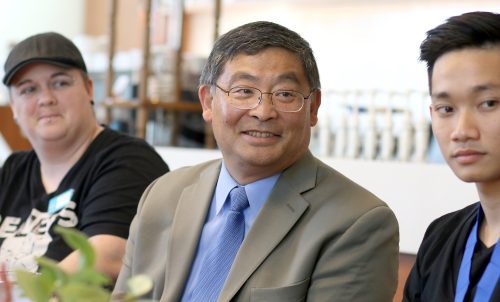This content was published: March 14, 2022. Phone numbers, email addresses, and other information may have changed.
Led by Blumenauer, Congress appropriates $800,000 to PCC for AI training
Photos and Story by Abe Proctor
Thanks to a Congressional appropriation championed by U.S. Rep. Earl Blumenauer, Portland Community College is the recipient of an $800,000 grant which will enable Portland-area residents to train for gainful careers in one of the fastest-growing sectors of industry – artificial intelligence (AI). The appropriation, which passed both houses of Congress and was signed into law by President Joe Biden in early March, will help ensure that Oregon’s workforce can remain competitive in the 21st-century economy.
“PCC would like to extend a special ‘thank you’ to Rep. Blumenauer for his forward-thinking advocacy for this initiative,” said PCC President Mark Mitsui. “This new funding will democratize access to AI technology and help our students, particularly our students from our most marginalized communities, gain leading edge skills that will lead to good jobs and careers. The curriculum will also be grounded in principles related to ethics and methods of rooting out implicit bias and algorithmic inequities in AI.
“Since the skills needed in the field cut across numerous disciplines, I believe that work in this space can also advance greater interdisciplinarity, something that our new organizational structure can facilitate,” he continued. “There are also implications for our new advanced manufacturing training facility at the Oregon Manufacturing Innovation Center. Students will gain leading edge skills, employers will gain leading edge workers and Oregon will gain a more equitable prosperity.”
The appropriation was part of a more than $10 million package, secured by Rep. Blumenauer, which will fund community projects in the Portland area.
“I am pleased that the Artificial Intelligence Program received robust funding support and look forward to its development,” said Blumenauer. “PCC is a leader in offering curricula that will create career pathways for students entering the job market today and tomorrow.”
According to the Oregon Workforce and Talent Development Board, AI education programs in the state are currently overfull and understaffed due to a recent surge of interest in the field. The appropriation will enable PCC to enhance the capacity of its AI program by hiring faculty and staff, while also modernizing its facilities and acquiring AI-capable computers and software systems for student training. The funds will also be used to bring more equity to the AI industry by extending opportunities to students from historically underrepresented communities and to students from across the state by way of remote education.
Artificial intelligence has occupied a portion of the collective imagination for many years, often as part of a doomsday scenario in science-fiction films and novels – but the reality is far more benign, said Jeremy Estrella, associate vice president of academic and career pathways at PCC. AI can be found in everything from online chat-bots to “smart” home appliances to video games and more.
“Applications for AI in our everyday lives are only expected to grow in the coming decades,” Estrella said. “With that growth we need to build these applications grounded in ethics and equity, and rooting out the potential for bias in AI. We are building our curriculum with these principles in mind.”
College officials hope to leverage the funding to build new partnerships, and expand existing ones, with technology companies in the area and to help drive growth in AI jobs across the state in an equitable way.
“We are committed to building access to the tech sector across the demographics of students we serve and helping students to see themselves working in technology,” Estrella said. “This funding will help create on-ramps to the tech sector and equitable support structures for the recruitment, retention and success of students from underserved communities.”
PCC AI Examples:
https://www.pcc.edu/programs/music-and-sonic-arts/pathway-creative-coding/
https://catalog.pcc.edu/programsanddisciplines/computerinformationsystems/

